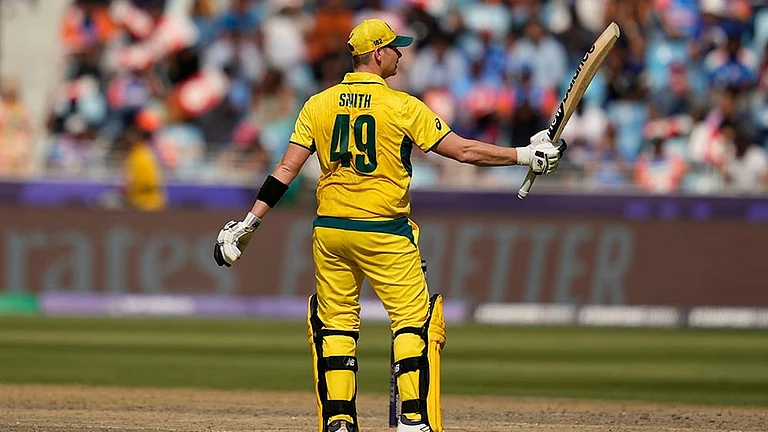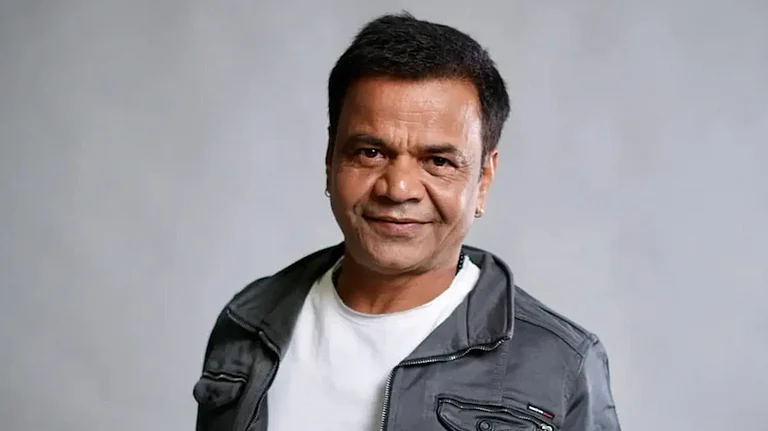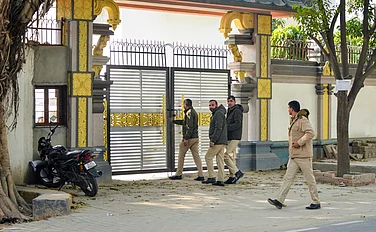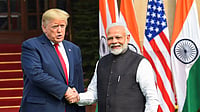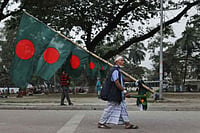Celebrating 20 years of the Vibrant Gujarat Summit, the investor gathering first organised in 2003 when he led the Gujarat government, Prime Minister Narendra Modi on Wednesday expressed confidence that India will soon emerge as a "global economic powerhouse."
On the second day of his two-day visit to the state, he also said that his government at the Centre made lakhs of women home-owners, and also targeted opposition parties for "stalling" the women's reservation bill for three decades.
He also took potshots at the previous Congress-led UPA government over its "indifferent" attitude to Gujarat's development.
Speaking at an event in Ahmedabad to mark 20 years of the success of the Vibrant Gujarat Summit, Modi said the state government sowed small seeds 20 years ago, and today they have grown into a big tree.
“We organised Vibrant Gujarat to make the state a growth engine of India. The country has seen this imagination becoming a reality. In 2014, when I was given the opportunity to serve the country, my aim was to make India a global growth engine,” Modi said, addressing the gathering of industrialists and businessmen.
“We are standing at such a point that India will soon emerge as a global economic powerhouse,” he said, adding that global agencies and experts are today talking on similar lines.
“In a few years, India will be among the world's top three economies. This is Modi's guarantee," the PM said.
He appealed to the industry to think of the sectors where India can explore new possibilities or strengthen itself.
From a humble beginning, the Vibrant Gujarat event has turned into an institution and many states later began to hold similar investor summits, Modi said.
Swami Vivekananda said that every work passes through three stages- first it is mocked, later it faces opposition and finally it is accepted, Modi noted, referring to the journey of the Vibrant Gujarat Summit.
"But when it was organised (in the early years), the then central government showed indifference to Gujarat's development. I have always talked about India's development through Gujarat's development, but those in power at the Centre had also associated Gujarat's development with politics," Modi said, in a veiled swipe at the UPA government.
Then ministers in the central government would tell him that they would attend the event, but later refuse, "perhaps after pressure from the top", he said, claiming further that instead of extending support, "they were busy creating hurdles" and foreign investors were warned not to go to Gujarat.
Despite this, foreign investors visited Gujarat because they could experience "good governance, fair governance, policy-driven governance, an equal system of growth and a transparent government in daily life," he said.
When the first Vibrant Gujarat Summit was held in 2003, he was a first-time chief minister and had faced crises such as the 2001 earthquake, collapse of cooperative banks and the 2002 Godhra tragedy and state-wide violence in its aftermath, Modi said.
"Those with an agenda" predicted that youth, industry and business will leave Gujarat, the prime minister said, claiming that there was a "conspiracy to defame" the state globally.
The summit, nevertheless, became a medium to showcase Gujarat's decision-making process, showcase the industrial capacity of India, and also its cultural tradition to the world, he said.
From a few hundred participants in 2003, today more than 40,000 delegates from over 135 countries participate in the summit, Modi noted.
In today's deeply connected world, financial cooperation among institutions is rising fast, and Gujarat already has GIFT City (Gujarat International Finance Tec-City), the prime minister said, adding "we should increase our effort to make GIFT City a globally competitive financial market place."
"This is the time for India to make a roadmap to become a developed, self-reliant country," he added.
Speaking later at Bodeli town in tribal-dominated Chhotaudepur district, where he launched projects worth more than Rs 5,000 crore, Modi said he does not have a house in his name, but "lakhs of daughters" of the country became house-owners thanks to his government's initiative.
"Today I am satisfied because my government has built four crore houses for people across the country. Unlike the past governments, a house for the poor is not just a number for us," he said.
"Lakhs of houses were built and registered in the names of women. Though I don't have a house in my name yet, my government made lakhs of daughters house-owners," the prime minister added.
The PM said World Bank president Ajay Banga was so impressed with the Gujarat education department's command and control centre in Gandhinagar, called as Vidya Samiksha Kendra, that he urged him to start such centres across the country, and said that the World Bank is ready to be a part of the project.
The new National Education Policy (NEP), which was left in limbo for three decades, was finally introduced by his government, he said.
The opposition "indulged in the politics of reservation instead of working to improve the education scenario in the state," Modi added.
The BJP government in Gujarat has built five medical colleges, two universities and 25,000 new classrooms in the entire tribal belt starting from Ambaji to Umargam, he said.
Speaking at a program organised by the BJP in Vadodara city to thank him over the passage of the bill reserving 33 per cent seats in the Lok Sabha and state assemblies for women, Modi alleged that opposition parties "stalled" the bill for three decades, and now they were trying to divide women on the lines of caste and religion when the bill had been passed.
Opposition leaders indulged in "match-fixing" in the past to ensure that the bill did not get Parliament's nod, he said.
"Do not be under the impression that they (opposition) have changed their attitude. They have now supported the bill because they were afraid of you. They did everything possible to stall the women's reservation bill for three decades. Just check their past track record. They made all types of excuses, tore apart the bill and did all sorts of drama in the past," he said.
-With PTI Input








